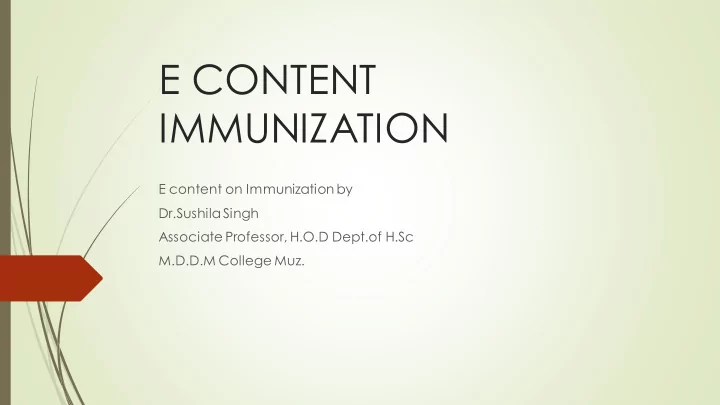

E CONTENT IMMUNIZATION E content on Immunization by Dr.Sushila Singh Associate Professor, H.O.D Dept.of H.Sc M.D.D.M College Muz.
Definition:- Immunization is the process whereby a person is made immune or resistant to an infectious disease, typically by the administration of a vaccine. Vaccines stimulate the body’s own immune system to protect the person against subsequent infection or disease. Immunization is a process by which an individual’s immune system becomes fortified against an agent known as the Immunogen. Immunization is a proven tool for controlling and eliminating life- threatening infectious diseases and is estimated to avert between 2 and 3 million deaths each year. It is one of the most cost-effective health investments, with proven strategies that make it accessible to even the most hard-to-reach and vulnerable populations. It has clearly defined target groups; it can be delivered effectively through outreach activities; and vaccination does not require any major lifestyle change.
Pictures showing Immunization:-
Immunization week:- Immunization Week, is celebrated by WHO in every year last week of april. World Immunization Week aims to highlight the collective action needed to ensure that every person is protected from vaccine-preventable diseases. The theme of immunization wewk 24-30 april 2018 was:- “Protected Together, #VaccinesWork”, It encourages people at every level – from donors to the general public – to go further in their efforts to increase immunization coverage World Immunization Week is a global public health campaign to raise awareness and increase rates of immunization againstvaccine- preventable diseases around the world.
#VaccinesWork by W.H.O:-
Principles of Immunization:- Vaccination is a safe and effective tool to prevent infectious diseases. In travel medicine, vaccines are indicated for individual protection of the traveler against destination-specific infectious disease risks but also for public health considerations to prevent the spread of infectious diseases at home and the travel destination. Recommended vaccination schedules and routes of administration should be adhered to, but immune memory is generally sufficiently effective to compensate for delayed immunizations. Several vaccines can be combined to account for limited time prior to departure. Special considerations apply to pregnant women and those with an impaired immune system. Yet a strict contraindication is relevant only in very rare cases and thorough risk- benefit considerations should be performed.
Properties of a well thought out Immunization schedule:- Epidemiologically relevant. Immunologically effective . Operationally feasible. Socially acceptable.
Immunization can be achieved in an active or passive manner: vaccination is an active form of immunization:-
Active Immunization:- Active immunization can occur naturally when a person comes in contact with, for example, a microbe. The immune system will eventually create antibodies and other defenses against the microbe. The next time, the immune response against this microbe can be very efficient; this is the case in many of the childhood infections that a person only contracts once, but then is immune. Artificial active immunization is where the microbe, or parts of it, are injected into the person before they are able to take it in naturally. If whole microbes are used, they are pre-treated. The importance of immunization is so great that the American Centers for Disease Control and Prevention has named it one of the "Ten Great Public Health Achievements in the 20th Century". [5] Live attenuated vaccines have decreased pathogenicity. Their effectiveness depends on the immune systems ability to replicate and elicits a response similar to natural infection. It is usually effective with a single dose. Examples of live, attenuated vaccines include measles, mumps, rubella, MMR, yellow fever, varicella,rotavirus, and influenza (LAIV
Passive Immunization:- Passive immunization is where pre-synthesized elements of the immune system are transferred to a person so that the body does not need to produce these elements itself. Currently, antibodiescan be used for passive immunization. This method of immunization begins to work very quickly, but it is short lasting, because the antibodies are naturally broken down, and if there are no B cells to produce more antibodies, they will disappear. Passive immunization occurs physiologically, when antibodies are transferred from mother to fetus during pregnancy, to protect the fetus before and shortly after birth. Artificial passive immunization is normally administered by injection and is used if there has been a recent outbreak of a particular disease or as an emergency treatment for toxicity, as in for tetanus. The antibodies can be produced in animals, called "serum therapy," although there is a high chance of anaphylactic shock because of immunity against animal serum itself. Thus, humanized antibodiesproduced in vitro by cell culture are used instead if available.
National Immunization Schedule:- BCG OPV DPT TT Hepatitis B Vitamin A Measles Japanese Encephalitis Rotavirus Rubella Injectable Polio Adult vaccine against Japanese Encephalitis.
Adverse events following immunization:- Vaccine product related reaction. Vaccine quality defect related reaction. Immunization error related reaction. Immunization anxiety related reaction. Coincidental event.
That’s All Thankyou Dr.Sushila Singh.
Recommend
More recommend